Deck 5: Consumer Choice
Question
Question
Question
Question
Question
Question
Question
Question
Question
Question
Question
Question
Question
Question
Question
Question
Question
Question
Question
Question
Question
Question
Question
Question
Question
Question
Question
Question
Question
Question
Question
Question
Question
Question
Question
Question
Question
Question
Question
Question
Question
Question
Question
Question
Question
Question
Question
Question
Question
Question
Question
Question
Question
Question
Question
Question
Question
Question
Question
Question
Question
Question
Question
Question
Question
Question
Question
Question
Question
Question
Question
Question
Question
Question
Question
Question
Question
Question
Question
Question

Unlock Deck
Sign up to unlock the cards in this deck!
Unlock Deck
Unlock Deck
1/100
Play
Full screen (f)
Deck 5: Consumer Choice
1
When consuming a good or service, the level of satisfaction obtained is known as:
A) contentment.
B) utility.
C) preference.
D) desire.
A) contentment.
B) utility.
C) preference.
D) desire.
B
2
The extent to which Melody enjoyed the Zac Brown Band concert is known as:
A) contentment.
B) utility.
C) preference.
D) desire.
A) contentment.
B) utility.
C) preference.
D) desire.
B
3
Economists measure utility:
A) by the dollar sign.
B) in utils.
C) by quantity.
D) in satising.
A) by the dollar sign.
B) in utils.
C) by quantity.
D) in satising.
B
4
Economists derive inferences about utility based on:
A) consumer behavior.
B) supply and demand.
C) price.
D) surplus and shortage.
A) consumer behavior.
B) supply and demand.
C) price.
D) surplus and shortage.

Unlock Deck
Unlock for access to all 100 flashcards in this deck.
Unlock Deck
k this deck
5
The sum of each unit's marginal utility is ______ utility.
A) total
B) average
C) marginal
D) competitive
A) total
B) average
C) marginal
D) competitive

Unlock Deck
Unlock for access to all 100 flashcards in this deck.
Unlock Deck
k this deck
6
The overall amount of satisfaction gained from consuming a given amount of a particular good is ____ utility.
A) total
B) average
C) marginal
D) competitive
A) total
B) average
C) marginal
D) competitive

Unlock Deck
Unlock for access to all 100 flashcards in this deck.
Unlock Deck
k this deck
7
Maksim derives four utils in consuming his first cookie. His second cookie provides three utils, and from his third cookie, he derives one util. What is his total utility from consuming all four cookies?
A) 1
B) 2
C) 4
D) 8
A) 1
B) 2
C) 4
D) 8

Unlock Deck
Unlock for access to all 100 flashcards in this deck.
Unlock Deck
k this deck
8
Amber derives six utils from her first wedding gift of towels. Her second gift set of towels gives her five utils. From her third gift set of towels, she derives two utils. Her marginal utility from the first set of towels to the third set of towels is _____.
A) 3
B) 3.5
C) 7
D) 7.5
A) 3
B) 3.5
C) 7
D) 7.5

Unlock Deck
Unlock for access to all 100 flashcards in this deck.
Unlock Deck
k this deck
9
(Figure: Utility Table 0) Using the information in the table above, what is the missing value at point c?
A) 8
B) 11
C) 23
D) 28
A) 8
B) 11
C) 23
D) 28

Unlock Deck
Unlock for access to all 100 flashcards in this deck.
Unlock Deck
k this deck
10
(Figure: Utility Table 0) Using the information in the table above, what is the missing value at point d?
A) 9
B) 22
C) 30
D) 32
A) 9
B) 22
C) 30
D) 32

Unlock Deck
Unlock for access to all 100 flashcards in this deck.
Unlock Deck
k this deck
11
(Figure: Utility Table 0) Using the information in the table above, what is the total utility for three units?
A) 4
B) 22
C) 26
D) 30
A) 4
B) 22
C) 26
D) 30

Unlock Deck
Unlock for access to all 100 flashcards in this deck.
Unlock Deck
k this deck
12
(Figure: Utility Table 0) Using the information in the table above, what is the total utility for the first unit?
A) 0
B) 12
C) 20
D) 22
A) 0
B) 12
C) 20
D) 22

Unlock Deck
Unlock for access to all 100 flashcards in this deck.
Unlock Deck
k this deck
13
(Figure: Utility Table) Using the information in the table above, what is the marginal utility for the first unit?
A) 0
B) 12
C) 20
D) 30
A) 0
B) 12
C) 20
D) 30

Unlock Deck
Unlock for access to all 100 flashcards in this deck.
Unlock Deck
k this deck
14
(Figure: Utility Table) Using the information in the table above, what is the missing value at point e?
A) 22
B) 24
C) 23
D) 54
A) 22
B) 24
C) 23
D) 54

Unlock Deck
Unlock for access to all 100 flashcards in this deck.
Unlock Deck
k this deck
15
Alice really likes a pair of pants she saw in a store in the mall. She values the pants at 45 utils based on her willingness to pay $45 for the pants. The price of the pants is only $30. What is the utility that Alice gains by purchasing the pants?
A) 15 utils
B) 30 utils
C) 45 utils
D) 75 utils
A) 15 utils
B) 30 utils
C) 45 utils
D) 75 utils

Unlock Deck
Unlock for access to all 100 flashcards in this deck.
Unlock Deck
k this deck
16
_____ occurs when increasing consumption of a good decreases marginal utility over a given period of time.
A) Utility
B) Total utility
C) Comparative utility
D) Diminishing marginal utility
A) Utility
B) Total utility
C) Comparative utility
D) Diminishing marginal utility

Unlock Deck
Unlock for access to all 100 flashcards in this deck.
Unlock Deck
k this deck
17
_____ is the overall amount of satisfaction that a consumer receives from consuming a given amount of a particular good.
A) Utility
B) Total utility
C) Comparative utility
D) Diminishing marginal utility
A) Utility
B) Total utility
C) Comparative utility
D) Diminishing marginal utility

Unlock Deck
Unlock for access to all 100 flashcards in this deck.
Unlock Deck
k this deck
18
(Figure: Total Utility and Marginal Utility) In the above figure, at what quantity is total utility maximized?
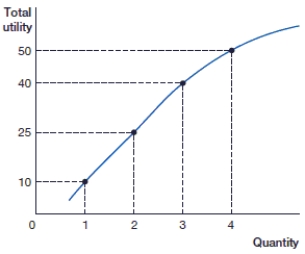
A) 1
B) 2
C) 3
D) 4

A) 1
B) 2
C) 3
D) 4

Unlock Deck
Unlock for access to all 100 flashcards in this deck.
Unlock Deck
k this deck
19
(Figure: Total Utility and Marginal Utility) In the above figure, what is the total utility for one unit?
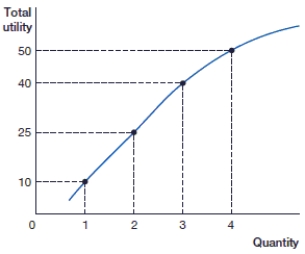
A) 10
B) 25
C) 40
D) 50

A) 10
B) 25
C) 40
D) 50

Unlock Deck
Unlock for access to all 100 flashcards in this deck.
Unlock Deck
k this deck
20
(Figure: Total Utility and Marginal Utility) In the above figure, what is the total utility for two units?
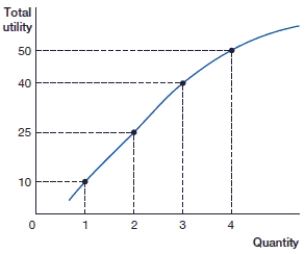
A) 10
B) 25
C) 40
D) 50

A) 10
B) 25
C) 40
D) 50

Unlock Deck
Unlock for access to all 100 flashcards in this deck.
Unlock Deck
k this deck
21
(Figure: Total Utility and Marginal Utility) In the above figure, what is the total utility for three units?
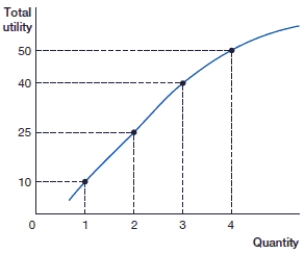
A) 10
B) 25
C) 40
D) 50

A) 10
B) 25
C) 40
D) 50

Unlock Deck
Unlock for access to all 100 flashcards in this deck.
Unlock Deck
k this deck
22
(Figure: Total Utility and Marginal Utility) In the above figure, what is the total utility for four units?
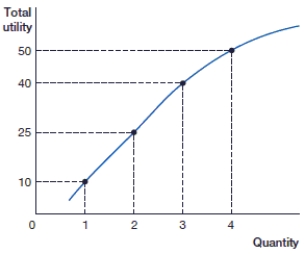
A) 10
B) 25
C) 40
D) 50

A) 10
B) 25
C) 40
D) 50

Unlock Deck
Unlock for access to all 100 flashcards in this deck.
Unlock Deck
k this deck
23
(Figure: Total Utility and Marginal Utility) In the above figure, what is the marginal utility of the 3rd unit?
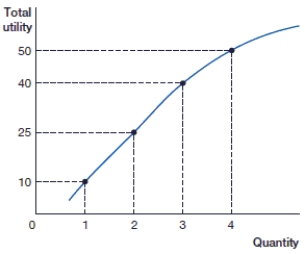
A) 15
B) 25
C) 35
D) 40

A) 15
B) 25
C) 35
D) 40

Unlock Deck
Unlock for access to all 100 flashcards in this deck.
Unlock Deck
k this deck
24
(Figure: Total Utility and Marginal Utility) In the above figure, what is the marginal utility of the 4th unit?
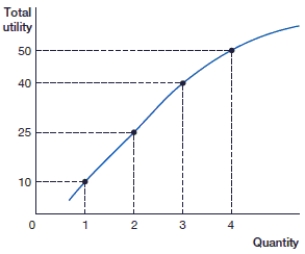
A) 10
B) 25
C) 50
D) 90

A) 10
B) 25
C) 50
D) 90

Unlock Deck
Unlock for access to all 100 flashcards in this deck.
Unlock Deck
k this deck
25
(Figure: Total Utility and Marginal Utility) In the above figure, what is the marginal utility of the 1st unit?
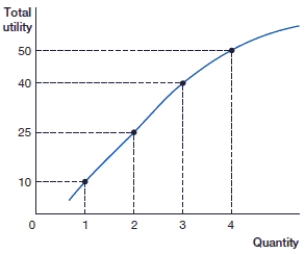
A) 10
B) 25
C) 50
D) 90

A) 10
B) 25
C) 50
D) 90

Unlock Deck
Unlock for access to all 100 flashcards in this deck.
Unlock Deck
k this deck
26
(Figure: Total Utility and Marginal Utility) In the above figure, what is the marginal utility of the 2nd unit?
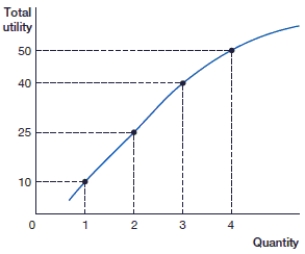
A) 10
B) 15
C) 25
D) 35

A) 10
B) 15
C) 25
D) 35

Unlock Deck
Unlock for access to all 100 flashcards in this deck.
Unlock Deck
k this deck
27
(Figure: Total Utility and Marginal Utility 2) In the above figure, what is the marginal utility of the first unit?
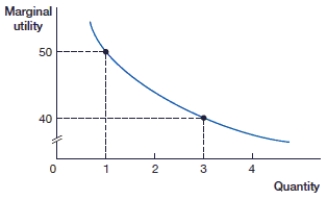
A) 40
B) 45
C) 50
D) 90

A) 40
B) 45
C) 50
D) 90

Unlock Deck
Unlock for access to all 100 flashcards in this deck.
Unlock Deck
k this deck
28
(Figure: Total Utility and Marginal Utility 2) In the above figure, what is the marginal utility of the third unit?
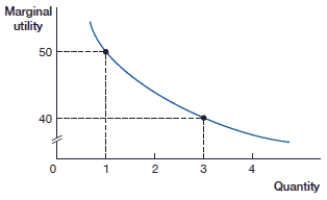
A) 40
B) 45
C) 50
D) 90

A) 40
B) 45
C) 50
D) 90

Unlock Deck
Unlock for access to all 100 flashcards in this deck.
Unlock Deck
k this deck
29
The diamond-water paradox can be explained by noting that the marginal utility of water is _____ and the total utility gained from water is:
A) low; low.
B) low; high.
C) high; low.
D) high; high.
A) low; low.
B) low; high.
C) high; low.
D) high; high.

Unlock Deck
Unlock for access to all 100 flashcards in this deck.
Unlock Deck
k this deck
30
A budget _____ is all combinations of consumption afforded by a consumer within a given income and current prices.
A) utility
B) restraint
C) constraint
D) year
A) utility
B) restraint
C) constraint
D) year

Unlock Deck
Unlock for access to all 100 flashcards in this deck.
Unlock Deck
k this deck
31
Consumers with a fixed budget will make purchases based on:
A) the budget constraint.
B) their willingness to buy.
C) the amount of market supply.
D) the highest marginal utility per dollar.
A) the budget constraint.
B) their willingness to buy.
C) the amount of market supply.
D) the highest marginal utility per dollar.

Unlock Deck
Unlock for access to all 100 flashcards in this deck.
Unlock Deck
k this deck
32
(Figure: Utility Table A) Price = $6
In the table, what is the marginal utility per dollar for two units?
A) 12
B) 18
C) 110
D) 252
In the table, what is the marginal utility per dollar for two units?
A) 12
B) 18
C) 110
D) 252

Unlock Deck
Unlock for access to all 100 flashcards in this deck.
Unlock Deck
k this deck
33
(Figure: Utility Table A) Price = $3
In the table, what is the marginal utility per dollar for three units?
A) 16
B) 24
C) 180
D) 276
In the table, what is the marginal utility per dollar for three units?
A) 16
B) 24
C) 180
D) 276

Unlock Deck
Unlock for access to all 100 flashcards in this deck.
Unlock Deck
k this deck
34
(Figure: Utility Table A) Price = $5
In the table, what is the marginal utility per dollar for five units?
A) 4.8
B) 16.8
C) 21.6
D) 28.8
In the table, what is the marginal utility per dollar for five units?
A) 4.8
B) 16.8
C) 21.6
D) 28.8

Unlock Deck
Unlock for access to all 100 flashcards in this deck.
Unlock Deck
k this deck
35
(Figure: Utility Table A) Price = $5
In the table, what is the marginal utility per dollar for four units?
A) 4.8
B) 7.2
C) 21.6
D) 36
In the table, what is the marginal utility per dollar for four units?
A) 4.8
B) 7.2
C) 21.6
D) 36

Unlock Deck
Unlock for access to all 100 flashcards in this deck.
Unlock Deck
k this deck
36
(Figure: Utility Table A) Price = $5
In the table, what is the marginal utility for five units?
A) 12
B) 24
C) 288
D) 312
In the table, what is the marginal utility for five units?
A) 12
B) 24
C) 288
D) 312

Unlock Deck
Unlock for access to all 100 flashcards in this deck.
Unlock Deck
k this deck
37
(Figure: Utility Table A) Price = $5
In the table, what is the marginal utility of the second unit?
A) 14.4
B) 48
C) 72
D) 82
In the table, what is the marginal utility of the second unit?
A) 14.4
B) 48
C) 72
D) 82

Unlock Deck
Unlock for access to all 100 flashcards in this deck.
Unlock Deck
k this deck
38
(Figure: Utility Table A) Price = $5
In the table, what is the marginal utility of the first unit?
A) 21.6
B) 72
C) 108
D) 216
In the table, what is the marginal utility of the first unit?
A) 21.6
B) 72
C) 108
D) 216

Unlock Deck
Unlock for access to all 100 flashcards in this deck.
Unlock Deck
k this deck
39
The bundle of goods that maximizes a consumer's utility, subject to a budget constraint, is:
A) diminishing returns.
B) total utility.
C) marginal utility.
D) optimal consumption.
A) diminishing returns.
B) total utility.
C) marginal utility.
D) optimal consumption.

Unlock Deck
Unlock for access to all 100 flashcards in this deck.
Unlock Deck
k this deck
40
The change in benefits from an additional activity is:
A) diminishing returns.
B) total utility.
C) marginal utility.
D) optimal consumption.
A) diminishing returns.
B) total utility.
C) marginal utility.
D) optimal consumption.

Unlock Deck
Unlock for access to all 100 flashcards in this deck.
Unlock Deck
k this deck
41
(Figure: Utility Table I) In the table, assume that a consumer has a budget of $12, pizza costs $3 per slice, and soda costs $2 per can. Utility will be maximized by buying:
A) 4 slices of pizza and no cans of soda.
B) 3 slices of pizza and 2 cans of soda.
C) 2 slices of pizza and 3 cans of soda.
D) 1 slice of pizza and 5 cans of soda.
A) 4 slices of pizza and no cans of soda.
B) 3 slices of pizza and 2 cans of soda.
C) 2 slices of pizza and 3 cans of soda.
D) 1 slice of pizza and 5 cans of soda.

Unlock Deck
Unlock for access to all 100 flashcards in this deck.
Unlock Deck
k this deck
42
(Figure: Utility Table I) In the table, assume that a consumer has a budget of $6, pizza costs $3 per slice, and soda costs $2 per can. Utility will be maximized by buying:
A) no slices of pizza and 3 cans of soda.
B) 1 slice of pizza and 1 can of soda.
C) 2 slices of pizza and no cans of soda.
D) 1 slice of pizza and 2 cans of soda.
A) no slices of pizza and 3 cans of soda.
B) 1 slice of pizza and 1 can of soda.
C) 2 slices of pizza and no cans of soda.
D) 1 slice of pizza and 2 cans of soda.

Unlock Deck
Unlock for access to all 100 flashcards in this deck.
Unlock Deck
k this deck
43
(Figure: Utility Table I) In the table, assume that a consumer has a budget of $17, pizza costs $3 per slice, and soda costs $2 per can. Utility will be maximized by buying:
A) 4 slices of pizza and 4 cans of soda.
B) 4 slices of pizza and 3 cans of soda.
C) 3 slices of pizza and 4 cans of soda.
D) 2 slices of pizza and 5 cans of soda.
A) 4 slices of pizza and 4 cans of soda.
B) 4 slices of pizza and 3 cans of soda.
C) 3 slices of pizza and 4 cans of soda.
D) 2 slices of pizza and 5 cans of soda.

Unlock Deck
Unlock for access to all 100 flashcards in this deck.
Unlock Deck
k this deck
44
(Figure: Utility Table I) In the table, assume that a consumer has a budget of $8, pizza costs $2 per slice, and soda costs $1 per can. Utility will be maximized by buying:
A) 4 slices of pizza and 0 can of soda.
B) 3 slices of pizza and 2 cans of soda.
C) 2 slices of pizza and 4 cans of soda.
D) 1 slice of pizza and 6 cans of soda.
A) 4 slices of pizza and 0 can of soda.
B) 3 slices of pizza and 2 cans of soda.
C) 2 slices of pizza and 4 cans of soda.
D) 1 slice of pizza and 6 cans of soda.

Unlock Deck
Unlock for access to all 100 flashcards in this deck.
Unlock Deck
k this deck
45
(Figure: Utility Table I) In the table, assume that a consumer has a budget of $18, pizza costs $4 per slice, and soda costs $3 per can. Utility will be maximized by buying:
A) 4 slices of pizza and 1 can of soda.
B) 3 slices of pizza and 2 cans of soda.
C) 2 slices of pizza and 3 cans of soda.
D) 1 slice of pizza and 4 cans of soda.
A) 4 slices of pizza and 1 can of soda.
B) 3 slices of pizza and 2 cans of soda.
C) 2 slices of pizza and 3 cans of soda.
D) 1 slice of pizza and 4 cans of soda.

Unlock Deck
Unlock for access to all 100 flashcards in this deck.
Unlock Deck
k this deck
46
(Figure: Utility Table Alpha) In the table, assume that a consumer has a budget of $18, apple juice costs $2 per bottle, and scones cost $3 each. Utility will be maximized by buying:
A) 5 bottles of apple juice and 3 scones.
B) 4 bottles of apple juice and 3 scones.
C) 3 bottles of apple juice and 4 scones.
D) 2 bottles of apple juice and 5 scones.
A) 5 bottles of apple juice and 3 scones.
B) 4 bottles of apple juice and 3 scones.
C) 3 bottles of apple juice and 4 scones.
D) 2 bottles of apple juice and 5 scones.

Unlock Deck
Unlock for access to all 100 flashcards in this deck.
Unlock Deck
k this deck
47
(Figure: Utility Table Alpha) In the table, assume that a consumer has a budget of $14, apple juice costs $2 per bottle, and scones cost $4 each. Utility will be maximized by buying:
A) 5 bottles of apple juice and 1 scone.
B) 3 bottles of apple juice and 2 scones.
C) 1 bottle of apple juice and 3 scones.
D) no bottles of apple juice and 4 scones.
A) 5 bottles of apple juice and 1 scone.
B) 3 bottles of apple juice and 2 scones.
C) 1 bottle of apple juice and 3 scones.
D) no bottles of apple juice and 4 scones.

Unlock Deck
Unlock for access to all 100 flashcards in this deck.
Unlock Deck
k this deck
48
(Figure: Utility Table Alpha) In the table, assume that a consumer has a budget of $18, apple juice costs $3 per bottle, and scones cost $4 each. Utility will be maximized by buying:
A) 6 bottles of apple juice and no scones.
B) 4 bottles of apple juice and 1 scone.
C) 3 bottles of apple juice and 2 scones.
D) 2 bottles of apple juice and 3 scones.
A) 6 bottles of apple juice and no scones.
B) 4 bottles of apple juice and 1 scone.
C) 3 bottles of apple juice and 2 scones.
D) 2 bottles of apple juice and 3 scones.

Unlock Deck
Unlock for access to all 100 flashcards in this deck.
Unlock Deck
k this deck
49
(Figure: Utility Table Alpha) In the table, assume that a consumer has a budget of $22, apple juice costs $3 per bottle, and scones cost $4 each. Utility will be maximized by buying:
A) 5 bottles of apple juice and 1 scone.
B) 4 bottles of apple juice and 3 scones.
C) 2 bottles of apple juice and 4 scones.
D) 1 bottle of apple juice and 5 scones.
A) 5 bottles of apple juice and 1 scone.
B) 4 bottles of apple juice and 3 scones.
C) 2 bottles of apple juice and 4 scones.
D) 1 bottle of apple juice and 5 scones.

Unlock Deck
Unlock for access to all 100 flashcards in this deck.
Unlock Deck
k this deck
50
(Figure: Utility Table Alpha) In the table, assume that a consumer has a budget of $7, apple juice costs $3 per bottle, and scones cost $2 each. Utility will be maximized by buying:
A) 2 bottles of apple juice and 0 scones.
B) 2 bottles of apple juice and 1 scone.
C) 1 bottles of apple juice and 2 scones.
D) 0 bottles of apple juice and 3 scones.
A) 2 bottles of apple juice and 0 scones.
B) 2 bottles of apple juice and 1 scone.
C) 1 bottles of apple juice and 2 scones.
D) 0 bottles of apple juice and 3 scones.

Unlock Deck
Unlock for access to all 100 flashcards in this deck.
Unlock Deck
k this deck
51
The change in quantity demanded of a good when price changes alter purchasing power is:
A) the substitution effect.
B) demand analysis.
C) utility analysis.
D) the income effect.
A) the substitution effect.
B) demand analysis.
C) utility analysis.
D) the income effect.

Unlock Deck
Unlock for access to all 100 flashcards in this deck.
Unlock Deck
k this deck
52
When the price of a good rises, consumer's purchasing power is:
A) unaffected.
B) increased.
C) decreased.
D) maximized.
A) unaffected.
B) increased.
C) decreased.
D) maximized.

Unlock Deck
Unlock for access to all 100 flashcards in this deck.
Unlock Deck
k this deck
53
In general, when the price of a normal good rises, consumers will purchase _____ of the good.
A) more
B) less
C) none
D) the same amount
A) more
B) less
C) none
D) the same amount

Unlock Deck
Unlock for access to all 100 flashcards in this deck.
Unlock Deck
k this deck
54
The _____ effect occurs when price changes and therefore leads to a change in quantity demanded and when consumers switch from relatively high-priced goods to relatively low-priced goods.
A) income
B) utility
C) substitution
D) optimization
A) income
B) utility
C) substitution
D) optimization

Unlock Deck
Unlock for access to all 100 flashcards in this deck.
Unlock Deck
k this deck
55
When the price of oranges rose, Melissa purchased apples instead. This is an example of the _____ effect.
A) income
B) utility
C) substitution
D) optimization
A) income
B) utility
C) substitution
D) optimization

Unlock Deck
Unlock for access to all 100 flashcards in this deck.
Unlock Deck
k this deck
56
When the price of DVDs rose, Ethan subscribed to an online video streaming service. This is an example of the _____ effect.
A) income
B) utility
C) substitution
D) optimization
A) income
B) utility
C) substitution
D) optimization

Unlock Deck
Unlock for access to all 100 flashcards in this deck.
Unlock Deck
k this deck
57
Amber enjoys a cup of coffee in the morning. When the price of her favorite brand increases, Amber switches to a cheaper brand. This is an example of the _____ effect.
A) income
B) utility
C) substitution
D) optimization
A) income
B) utility
C) substitution
D) optimization

Unlock Deck
Unlock for access to all 100 flashcards in this deck.
Unlock Deck
k this deck
58
When the price of ice cream rises, Juan is unable to afford as much ice cream as he used to buy. This is an example of the _____ effect.
A) income
B) utility
C) substitution
D) optimization
A) income
B) utility
C) substitution
D) optimization

Unlock Deck
Unlock for access to all 100 flashcards in this deck.
Unlock Deck
k this deck
59
Maneesh decides to move to a new apartment that is smaller because his rent recently doubled. This is an example of the _____ effect.
A) income
B) utility
C) substitution
D) optimization
A) income
B) utility
C) substitution
D) optimization

Unlock Deck
Unlock for access to all 100 flashcards in this deck.
Unlock Deck
k this deck
60
The price of cars has recently fallen. As a result, Maria decides to buy a nicer car because she can afford the payments. This is an example of the _____ effect.
A) utility
B) substitution
C) income
D) optimization
A) utility
B) substitution
C) income
D) optimization

Unlock Deck
Unlock for access to all 100 flashcards in this deck.
Unlock Deck
k this deck
61
In general, the substitution effect is larger than the offsetting income effect for ______ good.
A) an inferior
B) a substitute
C) a normal
D) a Giffen
A) an inferior
B) a substitute
C) a normal
D) a Giffen

Unlock Deck
Unlock for access to all 100 flashcards in this deck.
Unlock Deck
k this deck
62
In general, the income effect is smaller than the offsetting substitution effect for _____ good.
A) an inferior
B) a substitute
C) a normal
D) a Giffen
A) an inferior
B) a substitute
C) a normal
D) a Giffen

Unlock Deck
Unlock for access to all 100 flashcards in this deck.
Unlock Deck
k this deck
63
In general, the income effect is positively related to price changes for ______ goods.
A) inferior
B) substitute
C) normal
D) Giffen
A) inferior
B) substitute
C) normal
D) Giffen

Unlock Deck
Unlock for access to all 100 flashcards in this deck.
Unlock Deck
k this deck
64
In general, purchasing power increases when the price of which good falls?
A) inferior
B) all
C) normal
D) Giffen
A) inferior
B) all
C) normal
D) Giffen

Unlock Deck
Unlock for access to all 100 flashcards in this deck.
Unlock Deck
k this deck
65
When the income effect and the substitution effect move in the same direction, what is the result on the good whose price has fallen?
A) Demand increases.
B) Quantity demanded increases.
C) Demand falls.
D) Quantity demanded falls.
A) Demand increases.
B) Quantity demanded increases.
C) Demand falls.
D) Quantity demanded falls.

Unlock Deck
Unlock for access to all 100 flashcards in this deck.
Unlock Deck
k this deck
66
Goods for which the quantity demanded increases as price increases are _____ goods.
A) inferior
B) substitute
C) normal
D) Giffen
A) inferior
B) substitute
C) normal
D) Giffen

Unlock Deck
Unlock for access to all 100 flashcards in this deck.
Unlock Deck
k this deck
67
A graphical representation of the limit of all combinations of goods and services that a consumer can afford given her income and prices of the goods she wishes to buy is:
A) a demand curve.
B) a supply curve.
C) an optimization constraint line.
D) a budget constraint line.
A) a demand curve.
B) a supply curve.
C) an optimization constraint line.
D) a budget constraint line.

Unlock Deck
Unlock for access to all 100 flashcards in this deck.
Unlock Deck
k this deck
68
When the price of video games decreases, Elaina's budget constraint line:
A) rotates inward.
B) rotates outward.
C) remains unchanged.
D) divides in half.
A) rotates inward.
B) rotates outward.
C) remains unchanged.
D) divides in half.

Unlock Deck
Unlock for access to all 100 flashcards in this deck.
Unlock Deck
k this deck
69
All combinations of two goods that will use up a consumer's budget can be illustrated by _____.
A) an indifference curve
B) a supply curve
C) a total utility curve
D) a budget constraint line
A) an indifference curve
B) a supply curve
C) a total utility curve
D) a budget constraint line

Unlock Deck
Unlock for access to all 100 flashcards in this deck.
Unlock Deck
k this deck
70
Due to a budget constraint, Ethan is unable to purchase as many video games and movies as he would like. Therefore, Ethan's best option is to purchase:
A) only movies in the short run.
B) only video games in the short run.
C) nothing until his next paycheck.
D) the combination that will give him the most utility.
A) only movies in the short run.
B) only video games in the short run.
C) nothing until his next paycheck.
D) the combination that will give him the most utility.

Unlock Deck
Unlock for access to all 100 flashcards in this deck.
Unlock Deck
k this deck
71
(Figure: Budget Constraint Line) In the above figure, which combination of video games and movies can Maurice purchase?
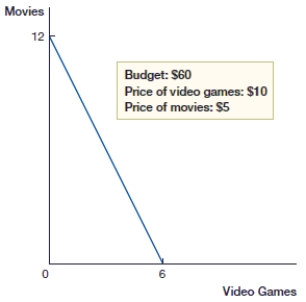
A) 5 video games and 4 movies
B) 4 video games and 5 movies
C) 4 video games and 6 movies
D) 4 video games and 4 movies

A) 5 video games and 4 movies
B) 4 video games and 5 movies
C) 4 video games and 6 movies
D) 4 video games and 4 movies

Unlock Deck
Unlock for access to all 100 flashcards in this deck.
Unlock Deck
k this deck
72
(Figure: Budget Constraint Line 2) In the above figure, if Jamal's budget decreases, which combination of video games and movies will he be unable to purchase?
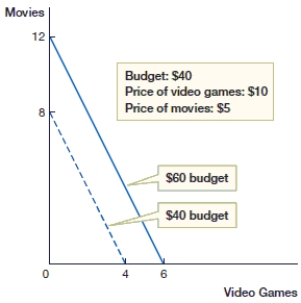
A) 2 video games and 4 movies
B) 3 video games and 2 movies
C) 3 video games and 1 movie
D) 4 video games and 2 movies

A) 2 video games and 4 movies
B) 3 video games and 2 movies
C) 3 video games and 1 movie
D) 4 video games and 2 movies

Unlock Deck
Unlock for access to all 100 flashcards in this deck.
Unlock Deck
k this deck
73
(Figure: Budget Constraint Line 3) In the above figure, if the price of video games increases, which combination of video games and movies will Erik be unable to purchase?
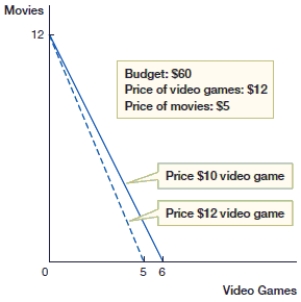
A) 1 video games and 6 movies
B) 2 video games and 5 movies
C) 3 video games and 4 movies
D) 4 video games and 3 movies

A) 1 video games and 6 movies
B) 2 video games and 5 movies
C) 3 video games and 4 movies
D) 4 video games and 3 movies

Unlock Deck
Unlock for access to all 100 flashcards in this deck.
Unlock Deck
k this deck
74
The budget constraint line shows the maximum allowable combination of goods that are:
A) inventoried.
B) produced.
C) sold.
D) purchased.
A) inventoried.
B) produced.
C) sold.
D) purchased.

Unlock Deck
Unlock for access to all 100 flashcards in this deck.
Unlock Deck
k this deck
75
The budget constraint line differs from the production possibilities curve in that it shows the maximum allowable combination of goods that are:
A) inventoried.
B) produced.
C) sold.
D) affordable.
A) inventoried.
B) produced.
C) sold.
D) affordable.

Unlock Deck
Unlock for access to all 100 flashcards in this deck.
Unlock Deck
k this deck
76
Consumption options inside the budget constraint are:
A) unattainable.
B) attainable and efficient.
C) attainable and inefficient.
D) optimal.
A) unattainable.
B) attainable and efficient.
C) attainable and inefficient.
D) optimal.

Unlock Deck
Unlock for access to all 100 flashcards in this deck.
Unlock Deck
k this deck
77
Kay has a budget of $20 for purchasing lunch and for purchasing bus tickets. Kay will most likely choose some combination of lunches and bus tickets. If Kay is like most people, she will choose options that:
A) are outside the budget constraint line.
B) maximize her utility.
C) are only on the budget constraint line.
D) are only inside the budget constraint line.
A) are outside the budget constraint line.
B) maximize her utility.
C) are only on the budget constraint line.
D) are only inside the budget constraint line.

Unlock Deck
Unlock for access to all 100 flashcards in this deck.
Unlock Deck
k this deck
78
Suzanne has a budget of $20 for purchasing lunch and for purchasing bus tickets. Suzanne will most likely choose some combination of lunches and bus tickets. She probably will not choose an option outside the budget constraint line because she:
A) is limited to the purchase of lunches only.
B) is limited to bus tickets only.
C) prefers to bring lunch from home.
D) does not have enough money for this option.
A) is limited to the purchase of lunches only.
B) is limited to bus tickets only.
C) prefers to bring lunch from home.
D) does not have enough money for this option.

Unlock Deck
Unlock for access to all 100 flashcards in this deck.
Unlock Deck
k this deck
79
The alternative combination of two goods that give consumers equal levels of satisfaction is illustrated by:
A) a budget constraint line.
B) an indifference curve.
C) a utility constraint
D) a demand curve.
A) a budget constraint line.
B) an indifference curve.
C) a utility constraint
D) a demand curve.

Unlock Deck
Unlock for access to all 100 flashcards in this deck.
Unlock Deck
k this deck
80
The _____ shows all the alternative combinations of products that give the consumer the same level of satisfaction.
A) budget constraint line
B) demand curve
C) utility constraint
D) indifference curve
A) budget constraint line
B) demand curve
C) utility constraint
D) indifference curve

Unlock Deck
Unlock for access to all 100 flashcards in this deck.
Unlock Deck
k this deck


